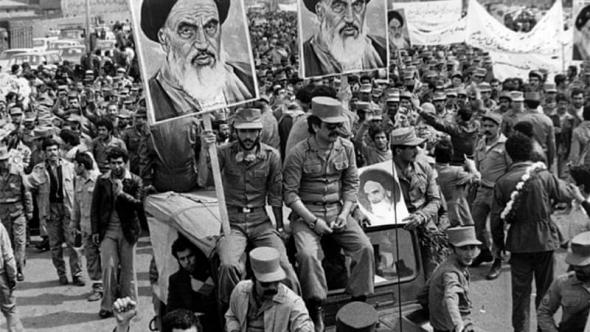November 5-7, 2020 - Columbia University
“Third World Historical: Rethinking Revolution from Iran to Ethiopia” is a scholarly conference organized at Columbia University that seeks to rethink the historiography of revolutionary movements and the heterogeneity of anti-colonial legacies. It is sponsored by the Department of Middle East, South Asian, and African Studies, and convened by Elleni Centime Zeleke (MESAAS, Columbia University) and Arash Davari (Politics, Whitman College).
This conference stages a conversation between the 1979 revolution in Iran and the 1974 revolution in Ethiopia to ask broader questions about the concept of world historical events, the significance of anti-colonialism, and the relationship between archives and theory. We seek to pose these questions through comparisons with revolutions across the Third World from Haiti to Algeria, Vietnam, and Grenada.
More often than not, the 1979 revolution in Iran is taken as a harbinger of all that is wrong with revolutionary politics today. Where the 1776 American Revolution and the 1789 French Revolution mark the affirmative possibility of revolutionary change, the 1979 Iranian Revolution marks its limits, where the Third World failed to replicate the spirit of the Enlightenment. Thinking against this historiography affords a point of departure for a reconceptualization of not only revolutionary movements but also the heterogeneity of anti-colonial legacies.

If Iran signifies all that is wrong with revolutionary politics, Ethiopia signals the final arrival of the last peripheral nation-state into modernity, setting the conditions for capitalism to exist. Let us listen to the sociologists: The 1789 revolution in France sets forth a model of revolutionary politics. The ensuing centuries of revolutionary politics bring about reiterations of the exemplar. After Ethiopia, the only revolution possible has to break from the Enlightenment altogether. And there is nothing to desire in that kind of social change.
Recent historiographical revision rooted in global history rightly challenges the exceptionalism shaping histories of revolutionary Ethiopia and Iran alike. Yet insofar as it replicates paradigmatic texts recounting European and American experiences, global histories too position Third World revolutionary experiences as derivative. How might we instead take these “peripheral” archives as central to rethinking the very concepts of history?
The conference is scheduled to comprise two panels for each theme listed below. It features a mix of junior and senior scholars, academics, artists, and activists. Each panel features a discussant. Comparative Studies of South Asia, Africa, and the Middle East has expressed interest in publishing a special issue featuring papers that arise from the workshop.
We welcome paper proposals on any of the following core themes:
-
“Anti-Colonialism”
What is the anti-colonial? And what is its relationship to revolution? Why do we tend to think the anti-colonial—or, for that matter, revolutions—as a unified and homogenous experience?
The assumption that anti-colonialism and revolution are not to be thought together may perpetuate a tutelary model—the notion that the “periphery” must first arrive before it can engage in revolutionary action, or the formation of genuinely new political institutions, structures, ideas. To think against this grain is to ask, how do we think anti-colonialism in its heterogeneity?
Revolutions from Ethiopia and Iran provide apt sites to do so. Neither readily signifies a case of anti-colonialism. And yet, they did pose questions and answers about a world structured by European colonialism. How are we to read these revolutionaries’ characterization of their efforts as anti-colonial?
These cases afford possibilities to think anti-colonialism and revolution together and in novel ways. What other cases are there? How, in other words, does South-South comparison afford new resources for thinking the anti-colonial?
2. The Periphery as World Historical and The Archive as Theory
Can the periphery be a world historical agent? Whether through Hegel or Marx, revolutions are understood as the essential world historical event—as, in fact, productive of the world historical. Is a world historical imaginary only possible in a European register? Does a turn away from that register entail a celebration of localism? To be precise, how has the Third World constituted the international? Can we think the international from it? And if so, how? What can we learn, for instance, from revolutionary experiences in Haiti (1794-1801) and Algeria (1954-1962)?
These questions beget an alternate approach to the history of political thought—one grounded not only in historical specificity, but also in a revised understanding of the world historical. They equally beget a different relationship to the archive—one that reads the vernacular as philosophy, the archive as theoretical text. How are we to think theory as history and history as theory at once from the Third World?
3. What is Revolution?
In the 1960s and 1970s, Third World activists engaged revolutionary talk to pose questions about the particularities of their immediate contexts. In the process, they posed new conceptions of revolution. Congealed manifestations of the term revolution can preclude our effort to think the event as experience. If revolution signals the disruption of existing categories, can we in turn disrupt congealed categories to think revolution? If sociologists are preoccupied with mapping revolutions as a set of patterns and stages, what would it mean to reposition the question of revolution in the specificity of the Third World?
Abstracts (300-500 words) should be sent before March 1, 2020 to Elleni Centime Zeleke at ecz2109@columbia.edu and Arash Davari at davaria@whitman.edu


